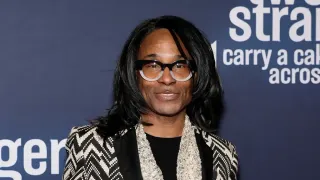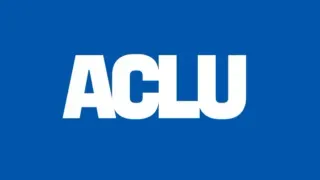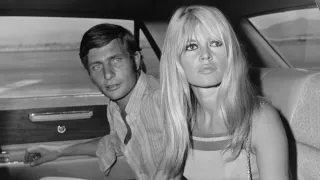February 3, 2021
Living the 'Daydream': J.R. Price on His Debut Album and a Tom Goss Duet
Kilian Melloy READ TIME: 8 MIN.
Musical newcomer J.R. Price is starting out with some top-tier LGTBQ musical talent in his corner. With his Freddy Freeman-produced debut album "Daydream" due out on Valentine's Day, Price teases its release with two singles: The empowerment anthem "Body Positive," and a slow-burning romantic duet titled "Dance with Me," featuring out singer-songwriter Tom Goss.
A non-supportive family life had a profound impact on Price at a young age. Seeking comfort in food, Price suffered from body dysmorphia, anorexia, binge eating, and suicidal depression, all culminating in a health crisis when he ended up hospitalized for hyper diabetes.
But Price found safety and self-expression in music – and one of his early heroes was none other than his future collaborator, Tom Goss, making their duet a dream come true.
Price, now healthy, happy, and sounding confident, chatted with EDGE about growing up gay and plus-sized, the range of musical styles and influences reflected in his upcoming album, and what he means when he says people don't fall in love anymore.
EDGE: Your new duet with Tom Goss gave you the chance to work with a childhood hero. How did that collaboration come about?
J.R. Price: Tom is actually a really good friend of my producer, Freddy Freeman. Freddy and I were working on my song "Dance with Me." We wanted to make it more ballad-y, more epic. I was listening to Meghan Trainor and John Legend's song ["Like I'm Gonna Lose You"]. I wanted this old school, duet-y vibe, and I was like, "I need someone who is romantic and also on-brand, but also is gonna do it with me." Like, I'm not gonna be able to call up Meghan Trainor.
Freddy was like, "Who are you thinking?" And I was like, "Honestly, the dream would be somebody like Tom Goss." I mean, he's in the bear community, he's beautiful, he's so romantic, and he has all these body empowerment songs: "Round in All the Right Places" and the video "Bears," of course, and his new song, "Nerdy Bear." They all celebrate bigger men. And Tom is a big deal to me! I grew up listening to Tom's music.
Freddy was like, "You know that I know Tom, right? This is not a big deal." I was like, "This is a huge deal! What do you mean, you know Tom?!" And Freddy was like, "I'm gonna send Tom an email right now."
Tom was super into it from the beginning. He made suggestions about lyrics. He changed the arrangement. He really collaborated with me; I was expecting, "I'll throw a vocal on." But no – he genuinely, deeply was connected with the material, and it blew me away.
EDGE: This seems like a good song for the pandemic – it has that vibe of people being separated, because in the video it's clear that you and Tom are not in the same space.
J.R. Price: My dream for the music video – that will never happen, because I'm poor – is that we're both dancing, but it's via, like, an online chat. We're looking at the laptops and we're having this big dramatic dance in front of a huge open window. Like, "Dance with me, but you can't because you're not here, and we're quarantined." There are so many people right now who are just, "I just want somebody to be here right now to dance with." I think it's really important for them to feel connected to people. If we can't be connected physically, we can still be connected emotionally.
EDGE: "Dance with Me" has a retro 1950s sort of sound. Were you looking to evoke that particular era?
J.R. Price: I think when I say "romantic ballad," that's what I mean. All of the great love songs, like "Unchained Melody," those great songs have that guitar pickup and that doo-wop sound. I think that the last time people were actually in love was "Teenager in Love" days. I don't think that anybody really falls in love anymore. So I think there's something classic and retro about just even the idea of a great love song.
EDGE: What do you mean? Everybody's into hookups now, rather than romance?
J.R. Price: I just think that we live in a culture today where people don't connect the same way. There's so much at your fingertips on your phone right now that nobody really focuses on the person in front of them and gets to know them. Even in quarantine people are still on their phones, watching Netflix – and, of course, hooking up; that's part of gay culture.
I don't think that people really open their hearts the same way. For gay people, specifically, if you think back to times when this song would be relevant, like in the '50s and '60s, gay people had to be super quiet. If you knew another gay person on the DL, like, that was it! You didn't have other people. And so, of course, your heart would just be bleeding for that person, because they're all you have.
I don't think that in today's culture we can wrap our head around something like that, and I think it's just amazing what the people before us had to go through, and the way that they loved was nothing like the way we love now. I mean, we love everybody; they had to love one person.
EDGE: "Dance with Me" is the second single from your upcoming debut album, "Daydream." The first single was "Body Positive," which was more an electro-pop dance anthem. Will the album as a whole be this diverse and eclectic?
J.R. Price: It's actually funny, because I love pop music so much, and I have so many different influences. Like, I'm literally influenced by everyone from Beyonc� to Shania Twain to, obviously, Britney forever! And so on the album, I wanted it to be kind of, like, everything. I think every track lives in a new sound. Like, "Daydream," I feel, is more of a Carly Rae Jepson / Rita Ora sound. And the I have a song called "Stranger," which is more like my rock song, but then also goes disco. That one's more like Bon Jovi, mixed with ABBA.
[Laughter]
J.R. Price: And I have "Gone Like the Wind," which is my Taylor Swift song, and "Take the Lead" is my Britney "Don't Let Me Be the Last to Know" ballad, and "Vibe Check" is my Selena Gomez song.
I just wanted [the album] to sound like a celebration of pop music over the last hundred years – starting with "Dance with Me," from, you know, back in the day, when things were retro, and it goes all the way up to music now, with "Vibe Check." I think that it would be a fine way for people to listen to the album, if they listen to every track and then try to put it in chronological order, because it very much goes from decade to decade if you really pay attention.
EDGE: Your first single, "Body Positive," confronts stigma around being plus-sized and curvy, and does it in a fun and sassy way. Do you think we're turning a corner, especially in gay culture – and, as we were saying, hookup culture – when it comes to getting away from a shallow and unrealistic idea of beauty?
J.R. Price: Not that I'm saying that it's bad to hook up or anything! As far as "Body Positive" goes, of course I'm calling out the culture; I just think that we're at a time where we're all one big family. We're all part of the alphabet mafia. I think that people who are calling people out for things like the way they look – are we not past that? I think we need to judge people on based on how they treat others. Life is too short to get so focused on what somebody looks like. We don't need to further isolate each other. We need a brotherhood. At the end of the day, we need to be the family that we didn't have growing up.
EDGE: Speaking of family, you had a rough family life growing up. Was that behind your interest in music? Was music a safe place for you?
J.R. Price: Oh, absolutely! I do mention my family a lot, because it was hard growing up. I was the only gay person in my entire family; I'm the only artist in my family; and I don't think that they really understand what it means to, first of all, be a Democrat.
[Laughter]
J.R. Price: But, second of all, to know what it means to feel things so deeply, as an artist. For me, if it wasn't food, the only thing I had to escape with was music. So I was locked in my room singing Britney, you know, from five years old, and that was the only thing that made me feel better. I didn't have friends, because I was the gay, fat kid; and I didn't have a family, because I was the gay, fat kid.
I was always left alone in my room – like, we would have big family gatherings and they would always send me upstairs while they all hung out, and I would be alone, watching TV. I like to say that all of my morals came from the Disney Channel – like, I was not raised well, but I definitely had those families on TV telling me how to act, and so I knew what was right and wrong. And the majority of the shows had everybody singing, so music just became such a part of who I am because when I would feel along, or lonely, I could always turn on Britney, and she would be there for me every time.
EDGE: Are you looking to pick up the banner that Tom and other LGBTQ artists have carried, and be an inspiration?
J.R. Price: I do strive to be an inspiration for people. I think for me it's hard, because I didn't get that storybook happy ending that you hear about other people getting – like, my family is never going to call me and apologize for how they treated me. They're stubborn, just like I am – it's something I got from them. I don't know if you're seen "The Prom" on Netflix, but there's a character in it played by James Corden who reconciles with his mother in this big, dramatic way. In that moment, I was like, "I'm never going to speak to my mother again." Like, "I'm never gonna have this moment."
I think that can also be inspiring, personally, because I don't think that people need to settle for toxic relationships just because we're related to them. Everybody needs to love themselves and value what they're bringing to the table. And I think if your family doesn't appreciate you, there is so much strength in saying, "No, I deserve better treatment from people who claim to be my family." I think that can also be empowering – to know when enough is enough.
For more on J.R. Price, go to his website. Price's debut album "Daydream" drops Feb. 14.






